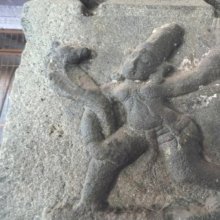Aghasura, Aghāsura, Agha-asura: 7 definitions
Introduction:
Aghasura means something in Hinduism, Sanskrit. If you want to know the exact meaning, history, etymology or English translation of this term then check out the descriptions on this page. Add your comment or reference to a book if you want to contribute to this summary article.
Aghasura has 5 English definitions available.
Images (photo gallery)
Languages of India and abroad
Sanskrit dictionary
[Deutsch Wörterbuch]
Source: Cologne Digital Sanskrit Dictionaries: Böhtlingk and Roth Grosses Petersburger WörterbuchAghāsura (अघासुर):—(agha + asura) m. der Asura Agha, Kaṃsa’s Heerführer, [Bhāgavatapurāṇa im Śabdakalpadruma]
Source: Cologne Digital Sanskrit Dictionaries: Sanskrit-Wörterbuch in kürzerer FassungAghāsura (अघासुर):—m. Nomen proprium eines Asura.
Sanskrit, also spelled संस्कृतम् (saṃskṛtam), is an ancient language of India commonly seen as the grandmother of the Indo-European language family (even English!). Closely allied with Prakrit and Pali, Sanskrit is more exhaustive in both grammar and terms and has the most extensive collection of literature in the world, greatly surpassing its sister-languages Greek and Latin.
See also (Relevant definitions)
Relevant text
Search found 16 books and stories containing Aghasura, Aghāsura, Agha-asura; (plurals include: Aghasuras, Aghāsuras, asuras). You can also click to the full overview containing English textual excerpts. Below are direct links for the most relevant articles:
Garga Samhita (English) (by Danavir Goswami)
Verse 2.6.15 < [Chapter 6 - The Liberation of Aghāsura]
Verse 1.6.45 < [Chapter 6 - Description of Kaṃsa’s Strength]
Verse 2.6.22 < [Chapter 6 - The Liberation of Aghāsura]
Chaitanya Bhagavata (by Bhumipati Dāsa)
Verse 2.1.338 < [Chapter 1 - The Beginning of the Lord’s Manifestation and His Instructions on Kṛṣṇa-saṅkīrtana]
Verse 2.1.161 < [Chapter 1 - The Beginning of the Lord’s Manifestation and His Instructions on Kṛṣṇa-saṅkīrtana]
Verse 1.9.30 < [Chapter 9 - Nityānanda’s Childhood Pastimes and Travels to Holy Places]
The Bhagavata Purana (by G. V. Tagare)
Chapter 12 - Slaying of Aghāsura < [Book 10 - Tenth Skandha]
Chapter 1 - Nārada Meets Bhakti (Devotion in a Human Form) < [Bhāgavata-Māhātmya: The Glory of Bhāgavata Purāṇa]
Chapter 31 - Gopīs’ song (prayer for Kṛṣṇa’s return) < [Book 10 - Tenth Skandha]
Vasudevavijaya of Vasudeva (Study) (by Sajitha. A)
Deviations from the Source Śrimad Bhāgavata < [Chapter 2 - Vāsudevavijaya—Authorship and Content Analysis]
Bhakti-rasamrta-sindhu (by Śrīla Rūpa Gosvāmī)
Verse 2.3.72 < [Part 3 - Involuntary Ecstatic Expressions (sattvika-bhāva)]
Verse 2.3.26 < [Part 3 - Involuntary Ecstatic Expressions (sattvika-bhāva)]
Verse 2.1.1 < [Part 1 - Ecstatic Excitants (vibhāva)]
Brihad Bhagavatamrita (commentary) (by Śrī Śrīmad Bhaktivedānta Nārāyana Gosvāmī Mahārāja)
Verse 2.2.200 < [Chapter 2 - Jñāna (knowledge)]
Verse 1.5.29 < [Chapter 5 - Priya (the beloved devotees)]
Verse 2.4.164 < [Chapter 4 - Vaikuṇṭha (the spiritual world)]
Related products

